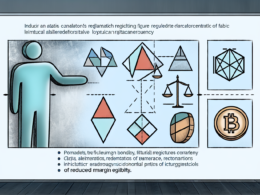Despite hopes for change, crypto debanking issues persist under the Trump administration. Custodia Bank CEO calls for action. #Crypto #Debanking #Finance
- Understanding Crypto Debanking: Key Insights and Relevance
- The Historical Context of Crypto Debanking: A Journey Through Regulatory Challenges
- Main Insights on Crypto Debanking: Opportunities and Challenges
- The Role of Federal Agencies in Crypto Debanking
- The Impact of Regulatory Uncertainty on Crypto Businesses
- Success Stories: Navigating Crypto Regulations
- Breaking Barriers: How Crypto Debanking Faces Regulatory Challenges
- The Future of Crypto Debanking: Emerging Trends and Predictions
- Final Reflections on Crypto Debanking: Insights for Industry Stakeholders
Understanding Crypto Debanking: Key Insights and Relevance
In the ever-evolving world of cryptocurrency, debanking has emerged as a critical concern for industry stakeholders. Despite the Trump administration’s perceived crypto-friendly stance, the issue of crypto debanking remains largely unaddressed, with significant implications for the future of digital assets. Caitlin Long, CEO of Custodia Bank, highlighted this concern at the ETHDenver conference, emphasizing that federal banking agencies have not reversed their anti-crypto guidance. This article delves into the intricacies of crypto debanking, exploring its historical context, current challenges, and potential future developments.
The Historical Context of Crypto Debanking: A Journey Through Regulatory Challenges
The journey of cryptocurrency through U.S. regulatory frameworks has been fraught with challenges. Initially viewed with skepticism, digital assets gradually gained acceptance, prompting a need for clear regulatory guidelines. However, this acceptance has been inconsistent, with federal agencies often imposing restrictive measures. The concept of “Operation Chokepoint 2.0” serves as a prime example, where certain regulatory efforts aimed to isolate crypto companies from traditional banking services. Understanding this context is crucial to comprehending the current state of crypto debanking.
Main Insights on Crypto Debanking: Opportunities and Challenges
The Role of Federal Agencies in Crypto Debanking
Federal agencies, including the FDIC and SEC, play a pivotal role in shaping the landscape of crypto debanking. While the SEC has made strides by establishing a Crypto Task Force and revising controversial rules, the FDIC’s stance remains largely unchanged. Under Martin Gruenberg’s leadership, the agency resisted adapting to technological advancements, posing significant barriers for crypto-friendly banks like Custodia.
The Impact of Regulatory Uncertainty on Crypto Businesses
Regulatory uncertainty continues to stifle innovation within the crypto industry. Businesses are often hesitant to engage with digital assets due to the perceived risks associated with regulatory non-compliance. This hesitation is further compounded by the lack of clear guidelines, making it challenging for companies to navigate the crypto landscape effectively.
Despite these challenges, some businesses have successfully navigated the regulatory maze. By adopting proactive compliance strategies and engaging in constructive dialogue with regulators, these companies have managed to thrive in the crypto space. Their success stories offer valuable insights and best practices for others seeking to overcome regulatory hurdles.
Breaking Barriers: How Crypto Debanking Faces Regulatory Challenges
Addressing the challenges posed by crypto debanking requires a multifaceted approach. It involves advocating for regulatory reforms, fostering collaboration between industry stakeholders, and promoting education and awareness about digital assets. By addressing these issues head-on, the crypto industry can pave the way for a more inclusive and innovative financial ecosystem.
The Future of Crypto Debanking: Emerging Trends and Predictions
As the crypto industry continues to evolve, several trends are likely to shape its future. Increased regulatory clarity, the rise of decentralized finance (DeFi), and the growing adoption of stablecoins are poised to transform the landscape of crypto debanking. By staying attuned to these developments, businesses can position themselves for success in the rapidly changing digital economy.
Final Reflections on Crypto Debanking: Insights for Industry Stakeholders
The issue of crypto debanking highlights the complexities and challenges of integrating digital assets into the traditional financial system. While significant progress has been made, much work remains to be done. Industry stakeholders must remain vigilant and proactive, advocating for regulatory reforms and embracing innovative solutions to foster a more inclusive financial ecosystem. By doing so, they can unlock the full potential of cryptocurrencies and drive meaningful change in the financial industry.











